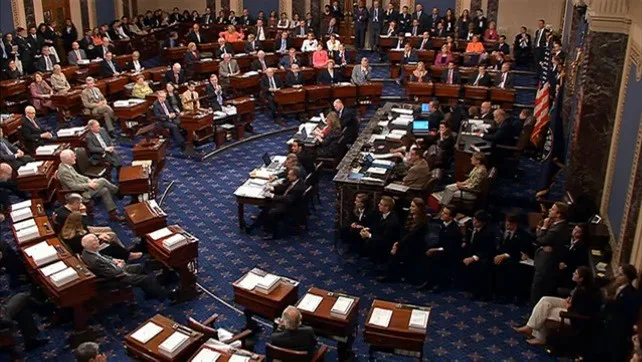Table of Contents
On March 23, Senate Minority Leader Chuck Schumer (D-NY) announced his intention to filibuster Donald Trump’s Supreme Court nominee, Neil Gorsuch. Schumer’s decision forced Senate Republicans to either temporarily abandon their hopes for filing the current Supreme Court vacancy or amend the Senate’s procedural rules. They opted for the latter. Currently, Senate Rule XXII requires sixty affirmative votes to hold a final vote on a Supreme Court nominee; this rule can only be changed with the consent of sixty-seven senators.
So why was the nuclear option reasonable? First, consider that the filibuster is anti-democratic. Unlimited debate provides political minorities with an unaccountable veto that obstructs majority rule and violates the Senate’s collective political rights. Senators do not have to publicly announce their intent to filibuster an executive or judicial nominee; instead, they can delay a vote by simply placing an informal ‘hold’ on a nomination. The Senate Majority Leader routinely respects hold requests because he can only set rules for floor debates with agreements unanimously approved by every senator. Ignoring a hold request could alienate a senator and derail unanimous consent agreements, making it harder to pass routine legislation. By tradition, the Senate does not even consider most measures that a single Senator plans to filibuster. This reality means that the mere threat of a filibuster is often enough to keep a majority-supported bill or nominee from even receiving a vote.
There is also a case to be made for the filibuster’s unconstitutionality. The Constitution only explicitly requires a super-majority to convict someone of impeachment, expel a member, override a presidential veto, ratify a treaty, pass a constitutional amendment, restore a confederate soldier’s right to serve in congress, or determine presidential disability. This enumeration suggests that the framers believed that a majority vote would be sufficient for legislative action in situations outside these seven cases. Other constitutional provisions imply this presumption and the Supreme Court has confirmed this principle. The Constitution’s text strongly implies that a majority vote is sufficient for legislative action in most cases. The filibuster violates this principle by imposing an effective supermajority requirement for votes on routine confirmations and bills.
Rule V’s prohibition on amending the filibuster rule is also constitutionally defective. This provision prevents a Senate majority from changing the filibuster rule even after a new Congress has been elected. Article I Section 5 of the Constitution clearly states, however, that the Senate has the power “to determine the rules of its proceedings.” Rule V permanently entrenches a previous Senate’s decisions by requiring sixty-seven votes to amend the filibuster rule. This hurdle makes lawmaking harder than it would be under a majority-vote system, obstructs some measures that have majority support, and makes it difficult for most ill-informed voters to identify the filibuster, rather than their senator’s incompetence, as the inertia’s root cause.
Nevertheless, Republicans had two options for overcoming Senator Schumer’s filibuster. First, Majority Leader Mitch McConnell (R-KY) could have pursued the so-called ‘nuclear option’. This tactic allows a simple majority to set a new Senate precedent by sustaining a point of order cutting off Schumer’s endless speech and permanently tabling an appeal. Second, the Republican majority could have reinterpreted the filibuster rule to permit a vote on Gorsuch’s nomination by modifying its existing procedures. The nuclear option is quicker and more convenient because it only involves a brief procedural exchange on the Senate floor. By way of contrast, it usually takes a minimum of three days to pass a Senate Resolution or bill amendment containing a Standing Order.
Liberals might counter by arguing that the filibuster is a part of the Senate’s venerable tradition permitting unlimited debate and tolerance for minority rights. There are two responses to this argument.
First, partisan polarization, declines in senatorial collegiality, large increases in the Senate’s legislative docket, and the noticeable rise of first-term senators who are willing to engage in blatantly inappropriate public filibusters to further their presidential aspirations has turned endless debate into a bigger institutional problem than ever before. The persuasiveness of normative and constitutional arguments can rest in part on current events.
Second, Democrats did not hesitate to change Rule XXII in 2013 after repeated Republican filibusters on Obama’s judicial nominees. Senator McConnell’s warning to Democrats right before the 2013 rule change went unheeded: “Senate Democrats are threatening to … change the rules of the Senate … And over what … a court that doesn’t even have enough work to do? I realize this sort of wishful thinking might appeal to the uninitiated [first-term] Democratic Senators who have served exactly zero days in the minority but, the rest of you guys should know better. Some of us have been around long enough to know the shoe’s sometimes on the other foot.”
Now the piper must be paid. Senate Democrats were warned but they persisted. Once traditions are thrown asunder for political expediency, it is very difficult to preserve them in highly polarized environments. The filibuster’s death, though, may not be such a bad thing. The judicial confirmation process has become over-politicized circus devoid of deliberation. A majority-vote confirmation requirement may not change this but, at the very least, it will make it easier for the political branches to staff the judiciary with able women and men.





